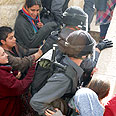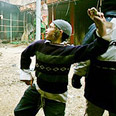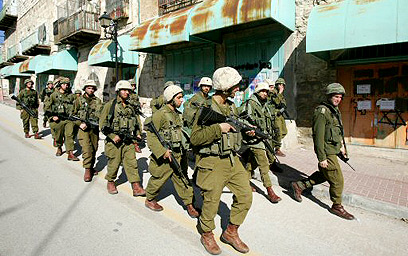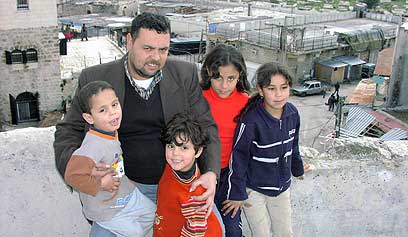

Hebron declared closed military zone
Security officials inform Hebron settler leaders youths who do no reside in town must leave by 10 a.m. Tuesday. Meanwhile, appraisers to examine damaged Palestinian homes, stores; Israel may offer compensation. Palestinian Hebron resident tells Ynet about settler violence
Those who do not reside in the city would be barred from entering or staying in Hebron. The order will go into effect Tuesday morning, thereby allowing rioters who came from other communities to leave Hebron voluntarily and evade arrest.
Security forces will start imposing the military order Tuesday at 10 a.m. A message to that effect has been relayed by the IDF to community leaders in Hebron. The leaders were informed they can remove youths who are not residents of Hebron in an orderly manner and without any clashes by 10 a.m. After that time, the army made it clear it will go ahead and remove non-resident youths by force.

Troops in Hebron (Photo: AP)
Anyone who wishes to enter Hebron and is not a resident will now have to apply for a special army permit. Security officials said that once the order goes into effect, anyone who hurls even one stone at security forces will be detained.
In a talk with Ynet, IDF officials said they had no intention of setting up roadblocks across the city, unless teenagers who do no reside in Hebron gather in large groups or clash with soldiers and police officers. Such youths will be immediately removed from the town, the army said.
Meanwhile, IDF and Civil Administration officials will arrive in Hebron in the coming days and weeks in order to look into damages sustained by Palestinian homes as a result of settler riots. Later, officials will examine the possibility of compensating the Palestinians.
Some appraisers have already arrived in Hebron and examined several burned down stores and damaged homes. According to Palestinian figures, dozens of homes and businesses were damaged.
Palestinians in Hebron have been facing a "Jewish intifada" for five days now, with stones, eggs, metal bars and bottles hurled at them and at security forces.
Nidal Awaiwi, who lives in the market area of the city, the focal point of tensions where settlers refuse to leave, told Ynet about the violence that he, his wife, and eight children have experienced.
"At first they burned stores in the old vegetable market, afterwards they came to us and the shops under the house, and started to destroy everything they came across," he said.
Settler girls curse, hurl stones
Awaiwi said that during one incident, "we were sitting at home knowing that settlers were rioting outside. They didn't stop throwing objects at the Palestinians, at the stores and businesses, and at passersby.
"Suddenly we heard the sound of stones coming closer to us, and then stones fell into the home. I looked outside and saw a large group of settlers who entered my home, into the children's room. They took the television that was there, went up on the roof, and threw it down. They threw everything that came to hand, rocks, bottles, and even large rocks. I don't know where they got them from…all the while they hurled abuse that I am ashamed to repeat."

Awaiwi and some of his children (Photo: Samih Shahin)
The incident took place while Awaiwi's eight children were at home, huddled in fear and shouting in hysteria, he said.
"There is no life here. There is danger everywhere. The interesting thing is that the settlers must enter through the army post on the roof in order to enter my home. In my opinion, not only did the soldiers not prevent this, they also directed them to do it. Around midnight, soldiers knocked on the door. I asked if they were soldiers or settlers, they said soldiers, and I opened the door. I thought they came to clarify what happened before, but instead they placed me and my wife against the wall, ordered us to stand with our faces against the wall, and severely beat my oldest, 16 year-old son," said Awaiwi.
The soldiers stayed in the house from midnight until three in the morning. Awaiwi says he begged them to let him use the bathroom. "Although I told them I was a diabetic, they didn't let me," he said.
The IDF Spokesperson's office said in response that "the details of the incident have not yet been established, and the claims are being checked."
The conversation with Nidal took place on his roof, with 20 settler girls watching on from across the street. The girls hurled insults and cursed in the face of journalists interviewing their "hostile neighbor." While at it, they decided to find yet another outlet for their anger, namely the police officers downstairs, who were again targeted with stones and curses.
'One big female settler'
The rocks and bottles left on the nets that protect shops at the Hebron market serve as a reminder of the battlefield several hours earlier. Khatem Jabari, a merchant in his 60s, says "we had another visit by the settlers, mostly female settlers, who burned tires and rolls them in our direction."
"My neighbor had merchandise made of glass broken, they caused extensive financial damages," Jabari said. "There was one big female settler here, real big, like a mule. She lifted the stall and threw away everything, That bitch is a barbarian."
Rajoub is one of Fatah's Hebron candidates, and his chances of being elected are thought to be very good. Other candidates include Hamas leader Naif Rajoub, Jibril's brother.
Fatah candidates are preparing for a large conference, but Hanan Ashrawi has already preempted them with an elections tour for her independent party list, The Third Way, headed by Finance Minister Salam Fayyad.
One of the residents, looking at the journalists surrounding Ashrawi, told a friend: "Everyone talks, nobody does anything, and everyone looks to steal and advance themselves. I swear by Allah that I'll only vote Hamas." His friend agrees, saying: "Inshallah (God willing), only Hamas."
Ali Waked contributed to the story















